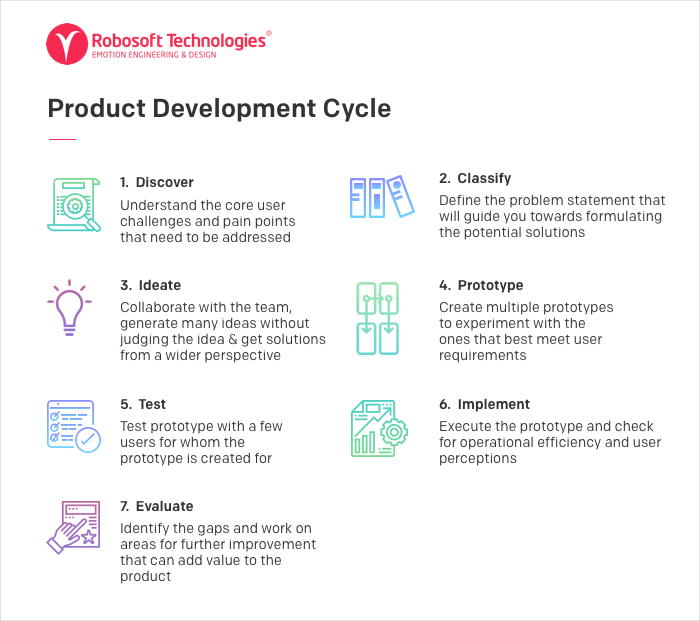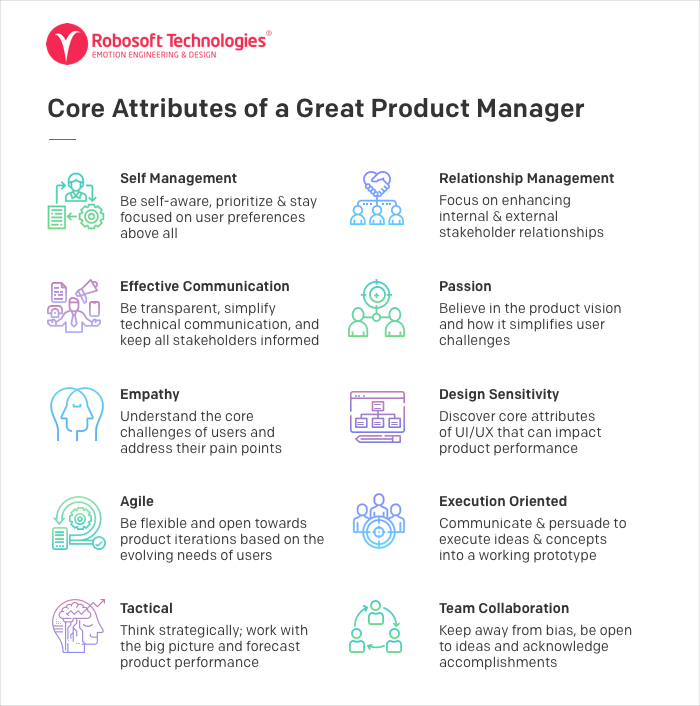The role and significance of a product manager is expanding due to the growing importance of digital platforms & integrated experiences, the need for product innovation & differentiation, increased personalization, and design focus. Product managers influence every aspect of the product lifecycle and perform core functions including that of a mini-CEO, fire-fighter, and an orchestra conductor– bringing alive the product vision & executing the day to day operations of product development. It is believed that developing the right skills as a product manager can help one transition into a C-suite professional as it is a good training ground for CEOs.
A great product manager ensures that all team members work harmoniously towards achieving the product vision. The key responsibilities include setting the long term vision and strategy, ensuring user engagement, satisfaction, and monetization. However, these may vary depending on the nature of the industry & enterprise and their views about the project manager’s responsibilities. While a few might be involved in documenting product roadmaps, conceptualizing, analyzing data, supervising the development & production process, conducting market & user research, sampling, testing, and forecasting, others might be involved in the promotion, distribution, sales, and marketing functions especially when the product is already in place.
Here’s an overview of the key phases of the product development cycle.

There are 5 key functions of a Product Manager: Setting the Product Vision, Strategy Development, Product Development, Execution & Testing, and Marketing & Sales. Let’s look at each of those:
Setting the Product Vision
Setting the product vision is the significant first step towards product development. It defines the vision and the broad journey towards accomplishing goals. This is based on the ideas and inputs from the team involved in developing the product. Setting specific goals, product specifications and envisioning the customer personas the product is meant for, ensuring if it solves the core challenges of the user, help in accomplishing their goals, and includes all the measures to assess the success of the product from time to time that is a part of the product development cycle.
Strategy Development
While setting the strategy two aspects have to be kept in mind:
- Who is the product intended for (Target customer/segment/market)
- What differentiates it from the competition
Once the vision is narrowed in, the steps to achieve it, i.e. the strategy must be defined. While the vision defines the product goals, the strategy defines the milestones and methods to achieve them. The strategy should be clear and realistic to ensure that the execution plan can be well distributed among the development team. This ensures that each member understands their role, KPI’s, and the interdependencies that lead to goal accomplishment.
The strategy is derived with insights from market & user research, which includes various quantitative and qualitative methods. It involves understanding the customer personas, their challenges, requirements, attitudes, and behaviors. Incorporating user research as part of the product development process will ensure that the product is custom-built to meet user expectations while ensuring a greater competitive advantage.
Product Development
The development phase begins with crafting a product roadmap that outlines the framework, specific actions, responsibilities, timelines, priorities, and sequence of product implementation.
It starts with defining technical specifications, making prototypes, and mockup designs. While these activities are normally covered by the UX team, a product manager can be involved in writing technical specifications like the PRD (Product Requirement Document) and FSD (Functional Specifications Document), defining the MVP (Minimum Viable Product) and to ensure it serves its purpose and alter product requirements based on the user inputs. The product manager’s main goal is to identify what the users want and communicate this information to the development team and project managers. They collaborate with the UX specialists to define the testing scenario, track results, and communicate revisions to the project manager.
Execution & Testing
During this stage, the team begins the product development as per the priorities set in the roadmap. They add new features to the existing product or work on building a new product, where the product manager guides and controls the execution process with the product roadmap.
To ensure successful usability testing, the product manager collaborates with potential customers to analyze user reactions & feedback and conveys these to the development team and project managers to make revisions basis their feedback.
Marketing & Sales
Once the product is completed, the product manager also plans the product positioning, launch, distribution, operating plans, and constantly tracks the growth and revenue graph of the product.
While these are functional attributes, let’s briefly look at the personal attributes that define great product managers.
Core Attributes of a Great Product Manager

Self Management
A product manager must be self-aware and avoid prioritizing product features based on any personal preferences. Lack of self-awareness might derail the execution process from the product roadmap and hamper key stakeholder relationships. It is thereby crucial to be aware and conscious and be able to demarcate between personal and user preferences and always prioritize the later. Being a product manager can be extremely stressful as you are dealing with key stakeholders within the organization and each of them has an opinion about the feature priorities. Managing deadlines, market demands, prioritization conflicts, resource constraints, and revenue targets all at once, and keeping emotions in check is not for the faint-hearted. Maintaining a good balance of product execution and managing stress levels is a must-have attribute for product managers.
Relationship Management
One of the key attributes of this role is efficient stakeholder management. A product manager is often the link between internal and external stakeholders. By developing trustworthy connections, product managers can facilitate harmony and help people in achieving their full potential by minimizing conflicts and maximizing collaboration which ultimately impacts product success. This can be especially challenging when tasked with balancing the customer demands well within the timelines alongside a resource crunch. Imagine being able to request the engineer to include a bug fix in the next sprint. Such requests can often be executed on the basis of the trust and relationship you’ve developed as a product manager.
Effective Communication
Being a product manager requires communicating with various stakeholders. Breaking down technical information and communicating this with the customers and vice versa to ensure transparency and consensus on likely reiterations, timeline extensions, and additional requirements that have not been accounted for. Timely and open communication can help avoid interpersonal conflicts across the entire stakeholder ecosystem and foster a positive and productive atmosphere throughout the product development process.
Passion
The ability to own the product, regardless of its performance and revenue forecasts, reiterating the product as you go, looking at how the users will respond to the product, going over and above to conduct usability testing, sampling, AB testing to ensure its performance, and ensuring that it solves the right challenge. To live, breathe, and be so passionate about it that you ensure its successful execution regardless of all the hurdles and obstacles that come your way, and believe in its purpose, and role in simplifying the lives of millions of users globally. All of this and more defines the product manager’s passion for the product.
Empathy
One of the most appreciated traits of a product manager is empathy and it is essential at every stage of the product lifecycle. Right from when user research is conducted, to empathize with the pain points of the users, their likes, dislikes, and priorities and with internal stakeholders to empathize with the team and understand their challenges and communicate in a way to address each of their concerns and have a profound impact on all the stakeholders.
Design Sensitivity
Understanding how the design can contribute to the product performance and understanding the core attributes of the UI/UX Design can help product managers convert the product vision into reality. This also facilitates greater collaboration with the UI/UX experts to deliver precisely what the customer is looking for. Design-centric product managers are ultimately more user-centric. Additionally, a fair knowledge of the analytical tools to assess and analyze product and performance-related concepts and examine the features that can be optimized is crucial.
Agile
Adopting an agile methodology while crafting a product roadmap is the key to creating products that customers love. A rigid roadmap that fails to adapt to flexible timelines and reiterations as per the dynamic market conditions and evolving user demands cannot scale its performance. Imagine having real-time data that highlights a key user trend that your product feature doesn’t include. While it’s important to stick to the product roadmap, being able to adapt and include user needs is the key to enhance product efficiency.
Execution-Oriented
A big part of the product management success is being able to execute all the ideas and concepts into a working prototype. This requires communicating, negotiating, persuasion, and motivating the team all along to ensure the product launch. Product managers should be able to inspire and orchestrate the engineering, legal, design, and customer support teams to execute as per the product road maps.
Tactical
Thinking strategically and always working with the big picture in mind are important qualities to be a successful product manager. Being clear on the product’s value proposition, target market, key features, and business goals; being able to forecast how the product will evolve in the future, constantly measure its performance against market trends and developments and paying attention to all details and carrying out all tactical work will guide the product strategy.
Product Management: it’s all about teamwork
Not much can be achieved without team collaboration. Your role as a product manager is to collaborate with the team to help you build, market, and sell the product. Appreciate their ideas and knowledge and inspire collaboration. Call for review meetings often, actively participate, listen, and seek consensus on important decisions. Share constructive feedback and acknowledge accomplishments. Keep away from bias; be open to ideas based on its relevance and alignment towards accomplishing the product vision, show how each idea matters, irrespective of where it comes from.
While there are a lot of critical attributes that contribute to the scope & success of an enterprise, product managers are at the core, creating products that customers love. They build products that influence positive customer experiences which help in accomplishing critical business and customer goals. A great product manager is a visionary who is passionate about solving user challenges and builds products that are embedded in empathy, trust, and transparency. While technical training and upskilling are equally important, product managers hone their skills on the job, that comes along with gathering valuable intelligence from various stakeholders and years of shipping great products. The more ownership they take up and the knowledge they gather of a particular industry and the customers within, the greater chances of leading the product towards success. Ultimately their passion and role as a product evangelist will be integral to their success and that of the product.





